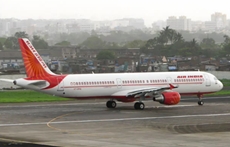Air India lost over 6,000 crore in 3 years, CAG report dumps profit claims
11 Mar 2017
National carrier Air India incurred a loss of Rs321 crore in 2015-16 instead of an operating profit of Rs105 crore that the airline declared last October, sources at the comptroller and auditor general (CAG) said on Friday.
 A CAG report tabled in Parliament also says the state-owned airline understated losses to the tune of Rs6,415 crore in three years from 2012.
A CAG report tabled in Parliament also says the state-owned airline understated losses to the tune of Rs6,415 crore in three years from 2012.
On Thursday, the civil aviation ministry claimed that Air India's revenue is expected to grow to Rs22,521 crore this financial year, a rise of around 10 per cent year-on-year, on account of higher passenger earnings and increased capacity.
"The national carrier is expecting a total revenue of Rs22,521 crore as compared to Rs20,526.11 crore in FY 2015-16, an increase of around 9.7 per cent over the previous year,'' minister of state for civil aviation Jayant Sinha said in a written reply in the Lok Sabha on Thursday.
The heavily-indebted airline had announced an operating profit (of earnings before interest payouts and taxes) of Rs100 crore in the 2015-16 fiscal - the first time in a decade.
In his Independence Day speech on 15 August 2015, prime minister Narendra Modi also spoke of Air India's turnaround, saying that the state-run airline is expecting to post over Rs100 crore operating profit in the 2015-16 fiscal and more than Rs700 crore in the current financial year.
"Today I can say with complete satisfaction that Air India, which used to be notoriously known for incurring losses, has improved its operations leading it to log operational profits," the prime minister said while speaking on the turnaround of major PSUs.
''The airline on a standalone basis made an operating loss of Rs321.4 crore ... We won't say this was due to misreporting but this was due to non-provisioning,'' said V Kurian, director general at the auditor's office.
Another CAG official, highlighting the state-run carrier's financial distress, said Air India didn't make provisions in its balance sheet for expenditures such as depreciation and maintenance.
The airline didn't respond when its comments were sought.
Kurian said the airline made inadequate provisions for payment of various liabilities, including outstanding amounts to the Airports Authority of India and payment to employees for encashing leave, and had also made excess valuation of a company property in Delhi.
The report says Air India didn't heed the advice of a government-appointed committee, formed to restructure the airline's expenses. The panel had recommended that the carrier could cut costs by accommodating its pilots and crew in lower-range lodgings near airports, instead of five-star hotels.
''Audit, however, noticed that the company continued to accommodate its crew in five-star hotels. For Delhi station alone, the company incurred an expenditure of Rs119 crore for hotel accommodation of its crew in five-star hotels from 2012 to 2016,'' the CAG report says.
The auditor mentioned the heavy loss the carrier incurred when it sold five of its wide-body Boeing 777-200 long-range aircraft to Etihad Airways at a significantly lower price than the ''indicative'' market value in 2013.
The planes were sold for $336.5 million, with each accounting for $67.3 million. Two companies - Avitas and Ascent - were apparently paying $86 and $92 million for each aircraft. But Air India sold the planes to Etihad after it found no buyers at the market value, the report says.
Air India said the planes were sold to save interest payments and to avoid maintenance costs.
The auditor was not convinced. ''While audit appreciates the savings realized in maintenance cost and interest payments, such savings cannot justify the shortcomings of the sale process.''
The CAG suggested the airline should monetise more of its assets faster to reduce its debt burden and speed up the leasing of narrow-body aircraft to improve its performance.
The auditor said inordinate delay in replacing its vintage fleet of A320 aircraft has defeated the objective of reducing maintenance costs.
The government is expected to use the CAG report to evaluate the progress of Air India's restructuring, after it was bailed out in 2012 with $5.8 billion of taxpayer's money. The amount of bailout funds given to the airline could be reassessed as it has breached loan limits set under the restructuring plan.
The increase in loans was ''due to failure in generating projected revenue, mainly on account of non-achievement of asset-monetisation target, increase in staff costs'', the report says.


















